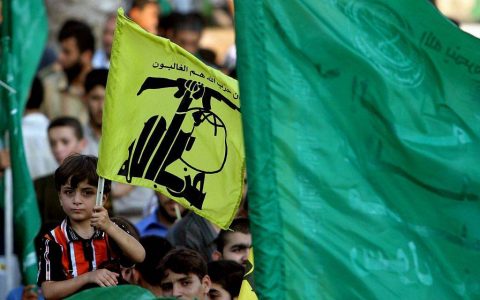
Hamas follows Hezbollah’s lead with latest Gaza drone attack
The firing of five rockets into Israeli territory from the Gaza Strip late Friday came as little surprise, despite the period of relative calm between Israel and the Palestinian enclave’s Hamas rulers.
For at least two weeks, Hamas has been accusing Israel of violating understandings with the terror group brokered by Egyptian and international mediators, but the Hamas declarations have not been overly aggressive.
However, immediately after it became known that two Palestinians (among them a 17-year-old) were killed in clashes with Israeli troops Friday along the Gaza border, various terror organizations in the Strip threatened that a response would soon come — and indeed it did.
Most of the rockets were fired at open areas, and one towards the outskirts of the southern city of Sderot, suggesting someone in Gaza was mainly seeking to send a message, not exact a price that could make the situation even worse.
The new-old formulation that the Palestinian factions, led by Hamas, are trying to impose is clear: If there are fatalities at the weekly protests on the border, there will also be rockets.
The desire to establish such a dynamic is reminiscent of the situation with Hezbollah and Lebanon. Just as Hezbollah leader Hassan Nasrallah declared that an attack on the terror group’s operatives in Syria would be met with a response, Hamas too is seeking to produce a formula of its own — aimed first and foremost at public opinion among Palestinians both in and outside Gaza.
The terror group is trying to create a perception among Palestinians that only it can protect the Palestinians, just as Hezbollah and Nasrallah are trying to convince the Lebanese public that only Hezbollah can contend with Israel and create deterrence.
In actuality of course, the two situations are different. Militarily, Hamas is not Hezbollah, to put it mildly.
It must be noted, though, that things are still far from simple for the Lebanese Shiite terror organization. Hezbollah is going through a financial crisis entailing reductions and cutbacks, and faces an even bigger problem in the political context in which it now operates: All of Lebanon is currently focused on the country’s collapsing economy.
Over the past week, Lebanese official leaders (if there truly are any other than Nasrallah) convened several times to discuss ways to save the Lebanese economy. If at this point Lebanon again finds itself dragged into a war on Nasrallah’s account, that would damage Hezbollah’s image as the country’s protector and inflict a hit on Nasrallah’s own image.
Furthermore, such a military adventure could lead to a mass exodus. If just a few years ago hundreds of thousands, and even millions, of Syrians made their way to Lebanon because of the Syrian civil war, this migration could be be reversed in the next war with Israel, with Lebanese citizens fleeing to Syria.
Ultimately, the lack of casualties on the Israeli side from the Hezbollah anti-tank missile attack at the beginning of the week, and the feeling in Lebanon of accomplishment or at least temporary achievement in that Israel had been “successfully” targeted, allowed everyone to take their finger off the trigger.
Israel’s decision not to retaliate for the anti-tank fire or strike heavily at the Hezbollah cells scattered throughout the area derived from a clear desire to end the incident as quickly as possible.
It is obvious to both sides that there will be additional stages in this campaign — but until then, Lebanon can return to economic matters and Israel can go back to the upcoming elections.
But with the Middle East being the Middle East, a decision not to respond up north, along with the enthusiasm with which Israel quickly ended the situation in the north, broadcasts a certain message of weakness in other areas. This causes actors such as Hamas to feel that the firing of a few rockets won’t be met with a response from Israel — or, if so, a minor one.
Source: TOI





